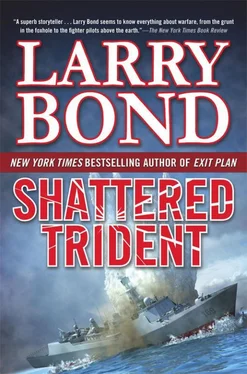The president’s reference to the growing economic crisis ended the argument abruptly. China’s well-being was threatened. Scoring political points wouldn’t matter if the economy came crumbling down around their ears.
Despite the economic turbulence in Europe and the United States, the Central Committee of the Chinese Communist Party had successfully managed a gradual slowdown of the economy—at least that was what the Chinese government claimed officially. In reality, the dip was far lower than desired. China had the resources, but like a juggler with an unexpected ball tossed into the mix, its rhythm was disrupted. It wouldn’t take much of a jolt before balls started dropping. That jolt was oil.
Nearly two-thirds of China’s annual petroleum demand came from outside the country, with half of it coming from the Persian Gulf, primarily Saudi Arabia and Iran. When scandal and the Arab Spring hit the Persian Gulf, the flow of oil began to wane.
The release of the data on Iran’s failed nuclear program happened just before Iran’s 2013 presidential elections. It triggered demonstrations and protests that were larger and more frequent than in 2009, plunging the country into chaos. By the end of 2015, strikes and outright sabotage began cutting deeply into Iran’s exports.
On the other side of the gulf, Saudi Arabia was embroiled in demonstrations demanding democratic elections. Clerics issued fatwas calling for work stoppages. Maintenance “accidents” happened more frequently. And the second largest oil producer in the world began to waver.
By the spring of 2016, the shortfall had become severe enough that China was pulling from her strategic oil reserves to meet the economy’s daily needs. At the projected rate, the shortfall would deplete China’s meager strategic reserve within a year. After that, the economy would feel the reduced flow of oil directly. None of the economic estimates presented to the CCP painted a rosy picture; some were downright dire.
The leaders in Beijing quickly eliminated Africa and Latin America as alternatives. Africa was too unstable, and Latin America just didn’t have the capacity. Russia wasn’t even briefly considered, due to security concerns. Then China’s leadership looked southward toward the huge oil and gas reserves right in their own neighborhood, in the Nansha Islands.
The Nansha Islands, or the Spratly Islands as they were known to most of the world, were scattered over hundreds of thousands of square kilometers of the South China Sea. Although made up of over a hundred small islands, atolls, and reefs, they couldn’t come up with five square kilometers of dry land between them. Beneath the waters surrounding them lay potential oil and gas reserves rivaling that of Kuwait, OPEC’s third-largest oil producer.
And oil and natural gas weren’t the only riches; the Spratly archipelago also possessed productive fishing grounds, already an important source of food and revenue for the countries that made up its coasts, and it flanked one of the world’s busiest shipping lanes.
But more than one country had claimed almost every island and reef, and decades of diplomacy hadn’t resolved a single dispute. If China were going to fix her energy crisis and secure her future, she’d have to resolve the issue by force.
* * *
President Chen remarked, “I’m assuming, Admiral, that you have a backup plan for providing air cover. Or are you suggesting Liaoning can be repaired in time?”
Wei shook his head as he spoke. “No, Comrade President, the mine caused extensive damage to her starboard propulsion shafts, propellers, and rudder. She’ll have to be towed to Dalian shipyard for permanent repairs. She will be out of commission for at least eight months, maybe longer.”
“I see,” said Chen. His tone and facial expression showed his disappointment. Their new aircraft carrier had been a key component in the Trident operations plan. Her availability after workups had dominated the timing of the entire operation.
“Well then, Admiral Wei, how will you provide the necessary air coverage?” Chen demanded.
“Sir, the Trident operations plan had a number of contingencies built into it. One included the possibility that Liaoning was incapacitated by enemy action. But it assumed that the carrier was lost after the first amphibious assault, not before.” Wei shot a quick glance over at General Su; he was still frowning. “However, General Wang and I have a modification that would provide fighter cover and dedicated ground support for the amphibious forces.”
Wei gestured toward the People’s Liberation Army Air Force commander, who picked up the explanation. “Comrade President, we propose shifting the bulk of the navy and air force’s tanker assets to the Guangzhou Military Region, along with the navy’s Su-30MK2 Flankers from the 10th Air Regiment. These will augment the Su-30MKK and J-11 Flanker squadrons in my 6th Air Regiment and will provide an adequate force to cover the invasion objectives in the Nansha Islands.”
“Won’t that compromise the air defense of the motherland?” countered Chen.
“No, sir,” Wang replied firmly. “In the campaign plan, the 4th and 5th Air Regiments have responsibility for air defense. The 6th Air Regiment was being held in reserve. We recommend using this reserve immediately, along with some naval fighters, to make up for the lack of carrier aviation. We need the additional combat aircraft, as well as the tankers, to sustain combat air patrols so far from our air bases.”
Chen nodded and leaned back in his chair. Satisfied, he polled the other members of the CMC. “Are there any other comments on the proposal by our navy and air force commanders?”
General Wen raised his hand. “I concur with the recommendations by Admiral Wei and General Wang, however I have still not heard a response to General Su’s concern that the element of surprise has been lost. We must assume that at least part of the campaign plan has been compromised. The Vietnamese are not fools. It would take a very serious provocation for them to act militarily. From their point of view, Trident would meet that criterion.”
Immediately after Liaoning had been safely returned to her berth, the PLAN began a meticulous but quiet sweep of the channel. It took two days and many passes by mine-hunting sonars and divers before the channel into Yalong Bay was declared clear.
As the search was expanded to cover the waters just outside the marked channel, the divers discovered a Russian MDM-6 mine on the sea floor. One of Russia’s most advanced naval mines, it was laid only by submarines.
The mine appeared brand-new. It had not been in the water long, and its fuzing mechanism had failed. Unfortunately, the nameplate data had been deliberately removed. After disarming the mine, Chinese ordnance engineers quickly took it apart, looking for any identifying marks or stock numbers. Several were found on some of the subcomponents, and armed with this data, the Chinese went to the Russians.
The Chinese ambassador in Moscow confronted the foreign minister directly, demanding to know who had purchased the mines. The Russians declined to answer, stating that the subcomponent numbers would not identify the specific mine. When pressed, the Russians politely refused to discuss arms sales with other nations, as they were confidential—the same terms the Chinese had insisted upon when they purchased Russian weapon systems. The Chinese ambassador walked away empty-handed, but that had been expected.
At the same time, China’s 11th Technical Reconnaissance Bureau hacked into the sales database of the Rosobornexport Company, Russia’s state-owned corporation in charge of all foreign arms sales. Also known as the “2020 Unit,” these highly trained Chinese cyber-warriors kept tabs on Russia’s military by monitoring Russian ministry of defense computer networks. They were very good at what they did.
Читать дальше

![Никки Сикс - Героиновые дневники. Год из жизни павшей рок-звезды[The Heroin Diaries - A Year in the Life of a Shattered Rock Star]](/books/78612/nikki-siks-geroinovye-dnevniki-god-iz-zhizni-pavshej-rok-zvezdy-the-heroin-diaries-a-yea-thumb.webp)










